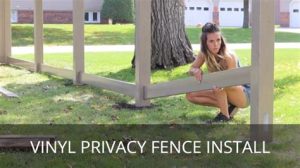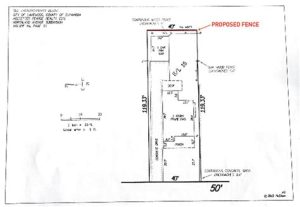Discover key insights on fence permit denial, including common reasons, options to address issues, reapplication steps, and when to seek professional help.When planning to install a fence, obtaining the necessary permit is a crucial step in ensuring a smooth process. However, what happens if your fence permit is denied? This blog post delves into the implications of a denied permit, exploring the various reasons that may lead to this decision and how it can impact your plans. Understanding the nuances of permit denial is essential for homeowners, as it can affect both project timelines and overall property goals. We will outline common reasons for denial and present options to address the issue, including the potential for reapplication. Additionally, we’ll discuss the importance of seeking professional help to navigate the complexities of zoning laws and building regulations. Join us as we unravel the challenges and solutions related to fence permits.
Understanding permit denial
When applying for a fence permit, it’s essential to understand that a denial can occur for various reasons. A permit denial happens when the local governing body decides that your application does not meet the necessary regulations or standards set forth by zoning laws or building codes.
Common reasons for a permit denial may include issues related to property lines, failure to adhere to height restrictions, or non-compliance with design guidelines. Additionally, if your proposed fence interferes with visibility at intersections or does not follow neighborhood aesthetics, your application may be rejected.
When faced with a permit denial, it is crucial to read the denial letter carefully. This document typically outlines the specific reasons for the denial, providing you with guidance on how to address the concerns. Understanding these factors will be pivotal in deciding your next steps, whether you choose to modify your application or consider alternative options.
Common reasons for denial
When applying for a fence permit, it’s crucial to understand the common reasons for denial. Many applicants are surprised to find that their requests can be turned down for various factors.
| Reason | Description |
|---|---|
| Zoning Violations | Fences must comply with local zoning laws, which dictate height, placement, and design. If your proposed fence does not adhere to these regulations, your permit will likely be denied. |
| Property Line Disputes | If there are uncertainties about your property lines or disputes with neighbors, the permit may not be approved until these issues are resolved. |
| Improper Documentation | Submitting incomplete or incorrect documentation can lead to an automatic denial. It’s essential to provide all required forms and plans accurately. |
| Non-Compliance with HOA Rules | For homeowners in a Homeowners Association (HOA), failing to meet community standards and regulations can also result in permit denial. |
Understanding these common reasons can help you prepare more effectively for the application process and prevent unnecessary delays.
Moreover, always ensure that your proposed fence aligns with local ordinances and is acceptable to neighboring properties. If you’re facing a denial, reviewing these aspects can provide insights into how to proceed.
By addressing these issues, you’ll increase your chances of successfully acquiring a fence permit in the future.
Options to address denial
Receiving a denial for your fence permit can be frustrating, but there are several options available to address it effectively. First and foremost, it’s essential to understand the specific reasons behind the denial so you can tackle those issues directly.
- Review the Denial Letter: Carefully read the denial notice provided by your local authority. It usually contains details on why your application was denied and what regulations apply.
- Gather Necessary Documentation: Collect any relevant documents that support your case. This might include property surveys, photographs, or records proving compliance with local zoning laws.
- Consult the Zoning Board: Many local governments have a Zoning Board of Appeals where you can present your case. Schedule a meeting to discuss your denial and explore any options for moving forward.
If you find that your situation is still unclear or unresolved, consider seeking professional assistance. Consulting with a land use attorney or a local contractor who is familiar with the permit process can provide valuable insights and increase your chances of a successful reapplication.
Reapplying for a fence permit
If your initial application for a fence permit has been denied, it can be disheartening. However, the good news is that you have the option to reapply.
- Understand the Denial Reasons: Before reapplying, it’s crucial to understand why your original application was denied. This will help you address any concerns and make the necessary adjustments in your new application.
- Gather Necessary Documentation: Make sure all required documents are in order. Missing or incorrect documentation can result in another denial.
- Consult Local Regulations: Ensure that your new application complies with local zoning laws, building codes, and any other regulations that may apply to fencing in your area.
It’s also wise to seek feedback from the authority that denied your first application. They might provide guidance on how to strengthen your case for the reapplication. This can significantly improve your chances of getting approved.
Another recommendation is to engage with your neighbors. If you can demonstrate that your fence aligns with community standards, it could bolster your application. Consider presenting the design, material, and any other relevant information that might allay concerns.
Lastly, remember to be patient. The reapplication process can take time, but being thorough and diligent will enhance your likelihood of a favorable outcome.
Seeking professional help
When faced with the unfortunate circumstance of a denied fence permit, navigating the appeal process and understanding the associated regulations can be overwhelming. This is particularly true for individuals who are unfamiliar with local zoning laws or building codes. In such cases, seeking professional help can provide valuable insight and assistance.
Consulting with a licensed contractor or an architect who specializes in local building regulations can significantly streamline the process. These professionals possess a deep understanding of what local officials look for in a fence permit application and can help identify potential issues that may have led to the denial. Additionally, they can advise on how to address these specific concerns before reapplying.
Moreover, hiring a permit expeditor can be beneficial. These are professionals who specialize in obtaining permits from local agencies. They can handle the paperwork, communicate with relevant authorities, and ensure that resubmissions meet all required guidelines, potentially increasing the chances of a successful application.
Frequently Asked Questions
What are some common reasons for fence permit denial?
Common reasons for fence permit denial include non-compliance with local zoning laws, incorrect application details, conflicts with property lines, or failure to meet height and design regulations.
Can I appeal a denied fence permit?
Yes, you can generally appeal a denied fence permit. The appeal process usually involves submitting a request for reconsideration to the local zoning board or another appropriate authority.
What should I do if my fence permit is denied?
If your fence permit is denied, review the reasons for denial provided by the permit review board. You may need to modify your application or address specific concerns before reapplying.
Are there alternative options besides a permit for building a fence?
Depending on local regulations, you may be able to build a low fence, decorative panels, or landscaping barriers without a permit. However, it’s crucial to verify with local authorities.
How long does the appeal process take for a denied fence permit?
The appeal process duration can vary, but it typically takes anywhere from a few weeks to several months, depending on local regulations and the complexity of the case.
What impact does a denied fence permit have on my property?
A denied fence permit may prevent you from erecting the fence as planned, affecting your property’s aesthetics and privacy. It can also lead to potential disputes with neighbors.
How can I improve my chances of obtaining a fence permit?
To improve your chances of obtaining a fence permit, ensure that your application is complete, adhere to local regulations and guidelines, involve your neighbors in discussions, and consider obtaining professional help for the design.




